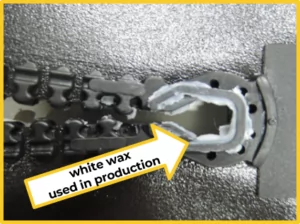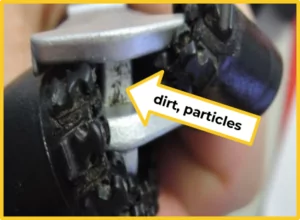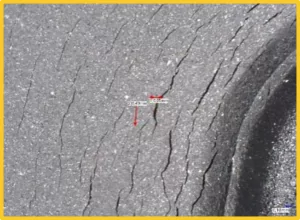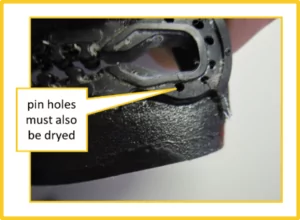KNOW-HOW FOR DIVERS
TIZIP zippers are characterized by absolute watertightness, airtightness, long-term durability and many other highly functional advantages. All of which are based on continuous research and development, leading to advanced material and production processes.
In order to achieve the maximum level of durability and a long lifespan, it is also important to care of the zipper. The following recommendations shall help to avoid early material aging and significantly improve your zipper’s lifetime.
Incorporation
Cleaning after diving
Keep the zipper dry
Lubricate the zipper
1 — Incorporation
Gluing
In order to achieve a sufficient adhesion between the zipper tape and the neoprene or trilaminate, very often a grinding process of the TPU coated tape is carried out. Please consider, that the TPU coating thickness is only a few micrometers. Grinding affects the TPU surface negatively and can lead to microscopic pinholes or cracks. Cleaning liquids and glue might diffuse into the textile leading to TPU material degradation and TPU delamination. If you think grinding cannot be avoided, please ensure that the grained areas are 100% covered by the adhesion glue, so that no water can migrate into the microscopic cracks and pinholes during zipper usage and result hydrolysis and microbiotic degradation, in the long term.
TIZIP always recommends avoiding grinding and to check out alternative glues. Insufficient adhesion of the zipper tape to the fabric can also lead to “water pockets” where water and moisture accumulate and cause material degradation. Please ask for some additional zipper tape in order to carry out detailed gluing tests. TIZIP will be happy to help you with.
MasterSeal

Cleaning as Pre-treatment
Do not use solvents or aggressive cleaning agents as these negatively affect the zipper material. Usable for cleaning are:
+ soapy water
+ spiritus
+ Isopropanol
MasterSeal

De-Waxing
After zipper production, it is necessary to lubricate the docking end with a white colored wax. Without proper lubrication in the factory, the slider would deform the docking end when closing and stick extremely to the TPU material. The lubrication wax needs to be completely removed after incorporation of the zipper into the diving suit and substituted by the TIZIP branded silicone-based lubricant provided in small tubes. In contrast to the silicone-based lubricant, the wax material ages after some time and gets hard and crumby. Furthermore, using the wax would result in a “deformation / bending” of the sealing lips of the docking end when closing the slider. Both, aging and the bending would lead to leakage and can be avoided by using the original silicone based TIZIP lubricant.
Question: Why is the silicone-based lubricant not used during the production process in order to avoid the de-waxing? If silicone based lubricants were used, there would be a risk that the silicone would “migrate” into the tape area and cause bonding problems during incorporation into the diving suit. For this reason, only a wax-based lubricant is used in production.
MasterSeal

2 — Zipper cleaning after diving
Dirt particles, especially between the teeth, can affect the sealing lip and thus negatively affect the tightness and durability.
- It is recommend to use a light soapy sweet water and a fine brush.
- Do not use solvents or aggressive cleaning agents as these negatively affect the function of the zipper.
- Do not dry clean or machine wash.
MasterSeal

3 — Keep the zipper dry after usage
Hydrolysis and Microbiologic Degradation
Any material ages, even then it’s based on high-end, tribological optimized thermoplastic components. The influence of water and moisture not only affects the TPU material directly but also encourage bacteria growth. Both significantly impact the material lifetime and zipper durability.
Even then, drying of the suit after diving takes some time, TIZIP strongly recommends to keep an eye on it. As the diving suit is completely wet on the outside and there’s also significant moisture inside, TIZIP recommends:
- Keep the diving suit on a coat hanger.
- Until the suit has completely dried, open the zipper completely to achieve a ventilation also inside of the suit.
- Ensure, that trapped moisture between overlapping flaps and the zipper will be dried as well.
- Turn the suite inside-out to completely dry the inside textile / neoprene
MasterSeal


4 — Properly storing
After the properly drying, the silicone-based lubricant needs to be applied on both end stops. Also, the tape should be wetted with a multifunctional oil-soaked cloth (e.g. BALLISTOL). This procedure significantly increases the resistance against moisture and bacteria degradation and therefore the zipper lifetime.
- Storing the drysuit with completely closed zipper is ok, if the suit, the overlaps, and zipper have been completely dried.
- Storing the drysuit with completely opened zipper prevents material degradation issues when not properly caring about the required drying.
After completely drying, the zipper can be closed. Be aware of storing the diving suit in a closed box or plastic bag lead to material and microbiological degradation as humidity will migrate into the box or bag. That’s why it’s not recommended to use a box for storing. That’s why it’s not recommended to use a box for storing.
- Avoid exposure to UV sunlight when drying / storing
Summary
“Nobody cares about the zipper”. But without proper installation, handling, and care even tribological optimized materials and high-tech production processes cannot avoid material degradation due to hydrolysis, bacteria, and wear and tear. The most important facts for extending the lifetime are:
-
- Hydrolysis and microbiotic degradation cannot be covered by the material only. Lack of care & not proper drying after usage is the main reason for delamination. Therefore, the zipper should be stored completely opened on a coat hanger to ensure a proper drying inside and outside. After proper drying of the suit, the zipper can be closed. Storage of the zipper in a closed box with increased humidity and temperature must be avoided.
- The zippers need to be lubricated. Use the original TIZIP silicone-based lubricant only. Apply gently the silicone-based lubricant at both end stops after completely cleaning and drying of the zipper. Also, the TPU coated tape should be wet with a multifunctional oil-soaked cloth. This procedure significantly increases the lifetime of the zipper.
- Dirt particles, especially between the teeth and slider, can affect the sealing lip and thus negatively affect the tightness and durability (wear and tear).
- Before using the zipper, it is recommended to use a light soapy water and a fine brush to clean the zipper & slider. Do not use solvents or aggressive cleaning agents as these negatively affect the material and function of the zipper.
- Be aware to proper close the zipper before diving. Keeping a small gap ( (just a few millimetres) between the sider and the docking end can lead to leakage.

